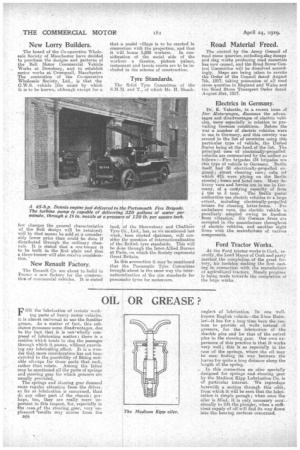OIL OR GREASE ?
Page 6

If you've noticed an error in this article please click here to report it so we can fix it.
FOR the lubrication of certain working parts of heavy motor vehicles, it is almost universal to use the familiar grease. As a matter of fact, this substance possesses some disadvantages, due to the fact that it is not■wholly composed of lubricating matter ; there is a residue which tends to clog the passages through which it passes, without exereising any lubricating effect. It is a wonder that snore consideration has not been devoted to the possibility of fitting suitable oil-cups for those parts that rock, rather than rotate. Among the latter may be mentioned all the parts of springs and steering gear for which greasers are usually provided. The springs and steering gear demand more regular attention from the driver, . • so far as lubrication is concerned, than do any other part of the chassis; perhaps too, they are really more linporant in this respect, for, especially in the case„of the steering gear, very unpleasant 'results may accrue from the
B28 neglect of lubrication. In one wellknown English vehicle—the 3-ton Daimler—it has for a long time been the custom to provide oil wells instead of greasers, for the lubrication of the shackle pins and for that of the swivel pins in the steering gear. Our own experience of this practice is that it works very well; this is so especially in the case of the springs, where the oil may be seen finding its way between the leaves for quite a long distance along the length of the spring.
, In this connection an oiler specially designed for springs andsteering gear by the Madison Kipp Lubrication Co. is of particular interest. We reproduce herewith a section through this oiler, from which it will be seen that the lubrication is simple enough; when once the oiler is filled, it is only necessary occa`e( sionally to lift the plunger, when a sufficient supply of oil will find its way down into the bearing surfaces concerned.






















